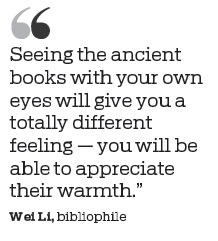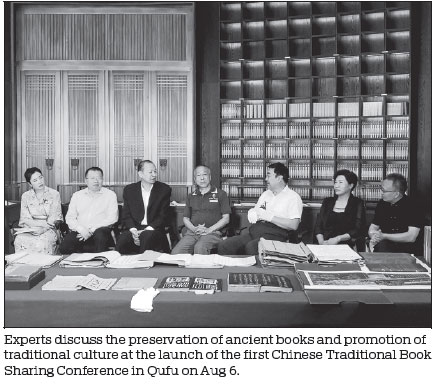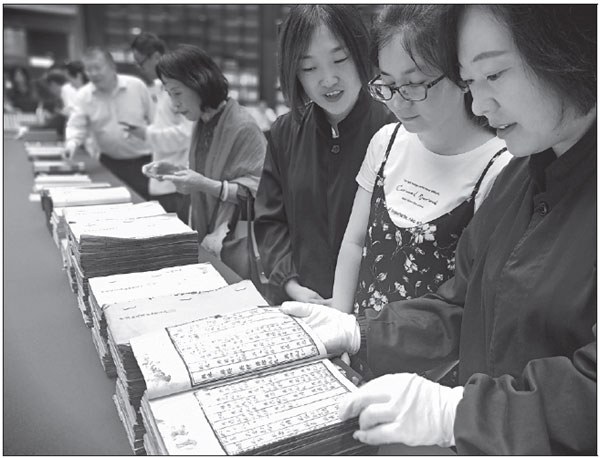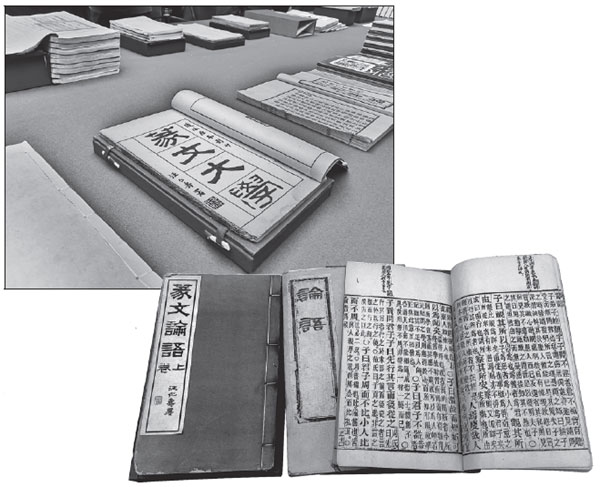Bringing the classics back to life
To revive a long-lost tradition, the National Library of China has teamed up with the Confucius Museum to host a book-sharing conference in Qufu, Wang Ru reports.
When it comes to celebrating Qixi Festival, or Chinese Valentine's Day, certain traditions usually spring to mind. While exchanging gifts and spending time with loved ones are common themes, in ancient times another custom was widely practiced: leaving books outside the main doors of houses to air and share them. It was forgotten in recent years.
In ancient times, books were a valuable commodity that was kept under lock and key. While this habit helped preserve them, books could just as easily fall prey to mold, dampness or bookworms - and so the practice of airing them every summer took hold.
During the Northern Wei Dynasty (386-534), agriculturalist Jia Sixie described how people followed this practice in Tian Gong Kai Wu, one of China's earliest and most comprehensive agricultural records.

But just as the word shai, which means "bask in the sunshine", also has the meaning of "showing off" in modern Chinese, the tradition of showing and sharing books was later adopted.
"Originally, the custom was not specifically carried out on Qixi, but it always took place in the hot summer months. Since Qixi happens to fall during this period, people started to show off their books during the festival," says Zhang Zhiqing, deputy director of the National Library of China.
In keeping with this tradition, the National Library of China has teamed up with the Confucius Museum in Qufu, a county-level city in East China's Shandong province, to organize the first Chinese Traditional Book Sharing Conference. Opening on Aug 7, the day of this year's Qixi Festival, the conference and related book sharing events will run through Sept 6 at venues located across the country.
A day ahead of the event's national launch, a number of precious ancient books went on display at the Confucius Museum in Qufu, including The Analects of Confucius, documents kept by the Kong family and rubbings from ancient stone inscriptions.
Wei Li, a bibliophile based in Beijing, says he was most impressed by a set of rubbings of 13 Confucian classics carved in stone under Emperor Qianlong's (1711-99) reign in the Qing Dynasty (1644-1911). "They are precious not only because they may have been given to the Kong family by the emperor, but also because they show some royal techniques never seen in folk art," says Wei.
Liao Ji, former director of the Chinese National Academy of Arts, says: "This set of stone-carved Confucian classics took more than 50 years to complete. The rubbings are exquisite and contain over 620,000 Chinese characters. It reminds me of another set of stone-carved works, the Xiping Confucian classics, which were made under the guidance of Cai Yong, a man of letters who lived during the Eastern Han dynasty (25-220). However, only less than 9,000 characters from this work remain in existence, and it's much less complete than the Qianlong work."
According to Zhang, cultural relics are relatively approachable artifacts for the general public to appreciate since they are often attractive as objects. But ancient books, with their dog-eared appearance, hard-to-recognize scripts and often unfathomable content, are not so accessible.
"But since President Xi Jinping asked that we enliven ancient books, we organized this event to help make them more accessible and give people a feel for them," says Zhang.
"The sensation is similar to how you feel when you meet a star face-to-face rather than seeing them on the screen. Seeing the ancient books with your own eyes will give you a totally different feeling - you will be able to appreciate their warmth," says Wei.
Among the ancient books on display, the Kong family documents are a highlight from the Confucius Museum's collection. As the hometown of Confucius and his offspring, many documents, such as family trees and local chronicles, were passed down through the family and are now stored at the museum.
"As an eminent family, the Kong family attached great importance to protecting the literature pertaining to their family. We have one set of Kong family trees that was revised during the Ming Dynasty (1368-1644), and another that was revised in the early 20th century," says Kong Xianglin, a former vice-dean at the Chinese Confucius Research Institute, who is a 75th-generation descendant of Confucius.
Other events related to book sharing will be held at salons, lecture halls and exhibition spaces in many Chinese cities over the course of the month.
In order to bring back ancient books to life, Lian proposes that experts and specialists comb through the ancient works and promote those that will resonate most with modern-day audiences.
"Since there are so many ancient books, most ordinary people won't have time to read them all. It's better that we guide them through the process and choose a few key works for them to read, explaining the ancient classics in the language of modern times."
Contact the writer at wangru1@chinadaily.com.cn
|
Staff members show visitors ancient books at the Confucius Museum during the first Chinese Traditional Book Sharing Conference in Qufu, Shandong province, on Aug 6.? |
|
Some other ancient books on show at the event. Photos by Wang Ru / China Daily |

(China Daily 08/12/2019 page20)



 Shandong Culture and Tourism Consumption Season
Shandong Culture and Tourism Consumption Season Culture, tourism sectors pick up in Shandong as epidemic wanes
Culture, tourism sectors pick up in Shandong as epidemic wanes

